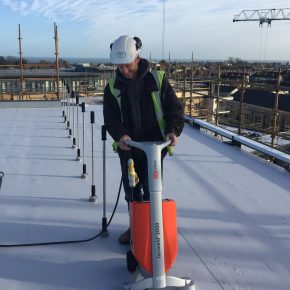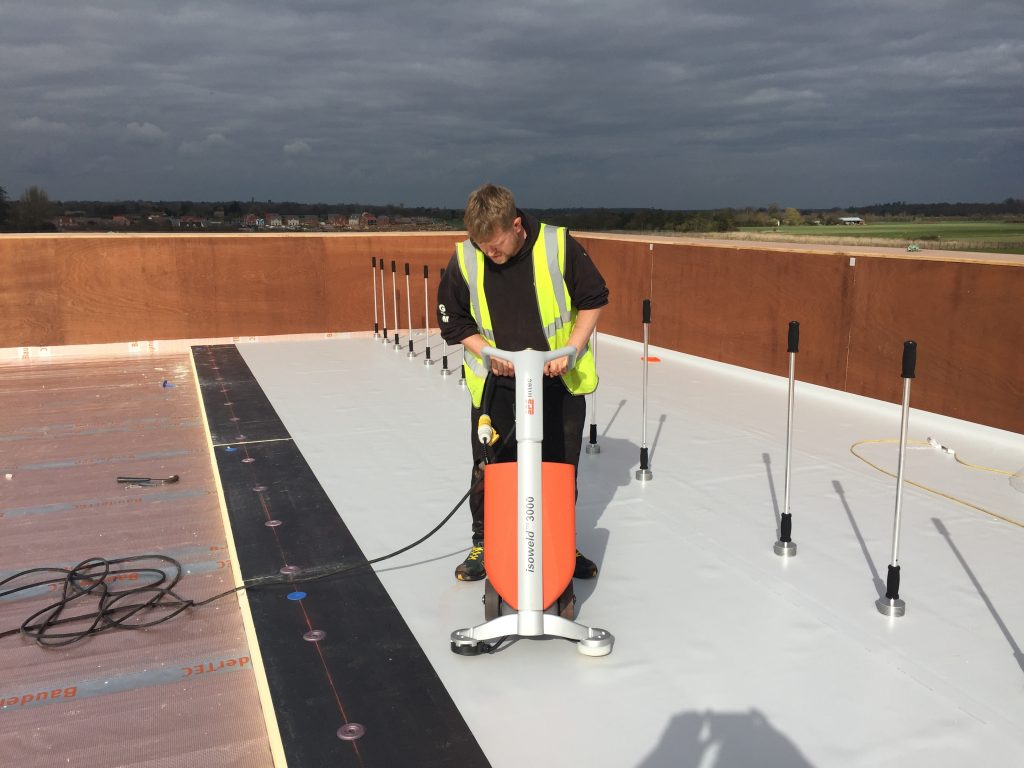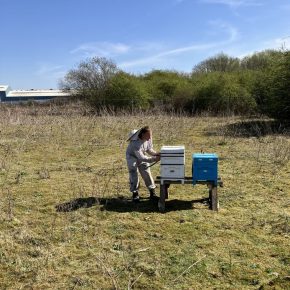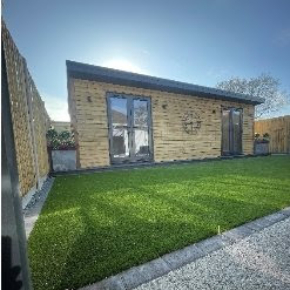
SFS: Adjustable fasteners, heat induction innovations, and a case in the North East
As construction gets back to work post-COVID, roofing installers and contractors will be asked to work faster and more efficiently to get projects back on track. The fastening solutions they choose can make all the difference to this effort, explains Martyn Holloway, Business Development Manager – Flat Roof at SFS.
“Predictions suggest that UK construction will recover quickly post-COVID. The vaccine rollout is playing a big part, while the Government is also banging two drums for the sector. One is to build more, the other to build back better – by which they mean more efficiently to higher standards.
Although contractors and installers have been working throughout the lockdowns, they’ve been subject to social distancing and fewer people on site. As a result, the work has been piling up and when we all finally get back, it’s going to be a case of feet flat to the floor. Literally so, for those working on flat roofs.

Everything’s changed, nothing’s changed
While plenty has changed during lockdowns, some things are waiting to come back and bite us. For roofing there are the regulations, the skills shortage and of course, the weather. While we can hope for another pleasant summer, we can definitely expect a wet and windy autumn and winter, bringing with it inevitable project delays. Roofers then have plenty to think about, with fast, reliable and easy to use solutions pretty much at the top of their wish list.
The good news is, in terms of fastening systems at least, there’s plenty of innovation on offer which can help them secure roofs efficiently, and step back to work with confidence.
Cut to fall – the concrete facts!
Flat roofs are an integral part of many new build and refurbishment projects. Concrete decks in particular have always been popular and in recent times have been increasingly specified for new build. The ability of this deck type to take extra loading, provide fire and acoustic performance as well as thermal mass has definite appeal to designers. For new build we also have seen more precast concrete hollow beam and beam and block deck systems being used as opposed to site poured concrete to reduce site installation time.
Insulation cut to falls schemes are increasingly used for providing the required roof falls on both new build and refurbishment flat roof projects and with concrete decks being no exception.
Screw or Glue?
When it comes to single ply membrane and insulation attachment to concrete decks there are various options open to the specifier. Whichever fastening method is used – mechanical or adhesive – there will be challenges.
The most time consuming and expensive option is to adhere the complete system. This involves priming the deck, bonding the air and vapour control layer, the insulation boards and the membrane with the correct weights of adhesive. It will take time to adhere each layer and specifically with cut to falls systems there may be multiple layers of insulation to contend with as part of the adhesion process. Adhesive installation can be affected by the cold or wet and in our climate, that can mean significant delays.
Some contractors prefer a hybrid solution whereby the insulation and any other layers below the membrane are mechanically fastened with just the membrane adhered. This allows the use of a polyethylene air and vapour control layer and removes the need for priming the deck as well as removing multiple layers of adhesive bonding. This option offers a faster, more cost effective solution and additionally secures existing bonded layers in the case of refurbishment projects, thereby adding to the install security.
The option of mechanically fastening both the membrane and insulation provides for a fast and cost effective solution. This is less weather dependent and additionally will cater for more exposed locations.
However, for cut to falls installation a large number of different lengths and combinations of fasteners and sleeves are required, thereby adding complexity to the install. Attempts at simplification will require the drilling of pilot holes up to 100mm deep. With precast concrete hollow beam decks where there is usually a requirement to restrict fastener embedment to 20mm this can be problematic.
Technology to the rescue!
The innovative TIA system from SFS is specifically designed to self-adjust to the insulation thickness, as the fastener engages the sleeve as well as the concrete deck.
Using the TIA fastener system provides for simplification of the fastener combinations required for the install. Due to its unique adjustment feature the system requires only 20mm deep embedment into the concrete and maximum 35mm deep pilot holes for the complete roof, reducing the extent of drilling required by up to 60% and speeding up the install. The consistent 20mm setting depth assists the fasteners to avoid reinforced bar and these are also suitable for use with precast concrete hollow beam decks.
The best of both worlds?
Perhaps the best option available for installing cut to falls insulation and membrane is by using heat induction welding technology, such as the patented isoweld® system from SFS, to install singly ply membranes. Since its launch, more than 20 million square metres of single ply membrane has been successfully installed.
SFS isoweld® 3000 machines weld the single ply membrane to specially coated metal stress plates located underneath, which also secure the insulation layer. The result is an extremely secure fix without penetrating the waterproof layer. Each plate only requires three seconds to weld, and the SFS isoweld® system is also easy to set up and calibrate. Suitable with both PIR, EPS and mineral wool insulation types, the heat induction technology can be used in conjunction with PVC, TPO and EPDM single ply membranes.
The membrane fasteners are installed in field fix patterns in comparison to the traditional lap fixing and therefore significantly fewer fasteners are required. Typically up to 50% fewer fasteners are required and the isoweld® field-fix system allows installers to use the widest membranes available which substantially reduces the extent of seam-welding required.
The TIA fastener system can be used in conjunction with isoweld® to offer a faster and more cost-efficient install for concrete decks.
A secure roof, a secure future
For well over a year, the construction industry has felt anything but secure. Luckily, it seems that we’ll soon all be getting back into the swing. Now’s the time to plan ahead and seriously consider the solutions and systems needed to both secure the roof – and the futures of each business. The answer lies in technology which can be used by everyone and which ensures fast and reliable fixings.
The difference that the right choice of fasteners can make is illustrated by a recent redevelopment project at Parsons Tower, Newcastle College in the North East. The brief for roofing and cladding contractor Longworth was to update the 1970s tower block with zinc roofing and cladding, composite panels and flat roofing elements.
For the roof, the cut to falls PIR insulation into concrete deck created issues with extensive drilling and the need for multiple combinations of fasteners and sleeves. The isotak® TIA adjustable fastener system was the ideal solution as this reduced fastener and polypropylene sleeve combinations by 50% and significantly bringing down drilling times.
With innovative products including TIA and isoweld®, this is a particular focus for SFS.”
Contact
SFS Group Fastening Technology Ltd
153 Kirkstall Road
Leeds
LS4 2AT
Phone number : +44 (0)330 0555 888
Email : ukenquiries@sfs.com
Visit Supplier's page
Latest news

30th April 2025
Digital Construction Week announces seminar programme for its landmark 10th edition
Digital Construction Week (DCW) returns to ExCeL London on 4 – 5 June 2025 with its most impactful programme yet. It brings together the best and brightest from across AECO, for two days of practical learning and idea sharing.
Posted in Articles, Building Industry Events, Building Industry News, Building Products & Structures, Building Services, Building Systems, Exhibitions and Conferences, Information Technology, news, Restoration & Refurbishment, Retrofit & Renovation, Seminars
29th April 2025
Senior pledges to ‘bee’ part of the solution with new biodiversity initiative
Senior Architectural Systems has installed its first on-site beehive, marking another step forward in its commitment to sustainability and biodiversity.
Posted in Articles, Building Industry News, Building Products & Structures, Building Services, Curtain Walling, Doors, Glass, Glazing, Innovations & New Products, news, Restoration & Refurbishment, Retrofit & Renovation, Sustainability & Energy Efficiency, Walls, Windows
29th April 2025
West Fraser range delivering key benefits for South-East carpentry company
An experienced carpenter and building site manager who has recently set up his own company is using high performance panel products from the West Fraser range.
Posted in Articles, Building Industry News, Building Products & Structures, Building Systems, Case Studies, Garden, Restoration & Refurbishment, Retrofit & Renovation, Sustainability & Energy Efficiency, Timber Buildings and Timber Products
29th April 2025
CPD Courses Available Online From Ecological Building Systems
Ecological Building Systems, a leading supplier of natural building products for sustainable construction, has revealed its comprehensive CPD programme for the year ahead.
Posted in Articles, Building Industry Events, Building Industry News, Building Products & Structures, Building Services, Continuing Professional Development (CPD's), Information Technology, Innovations & New Products, Insulation, Restoration & Refurbishment, Retrofit & Renovation, Seminars, Sustainability & Energy Efficiency, Training, Walls, Waste Management & Recycling
 Sign up:
Sign up: